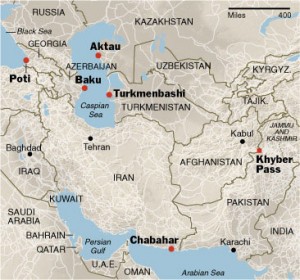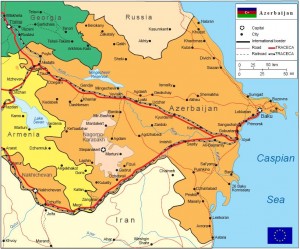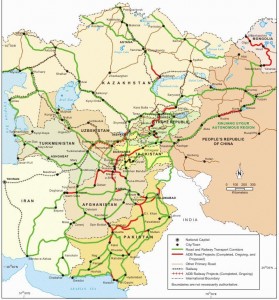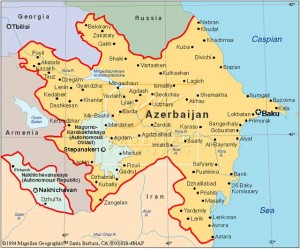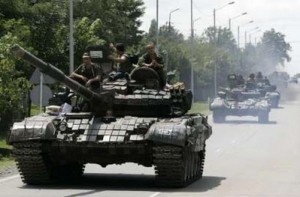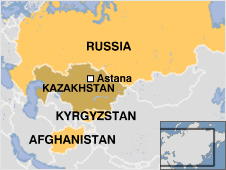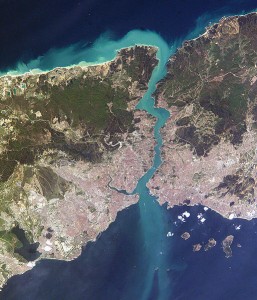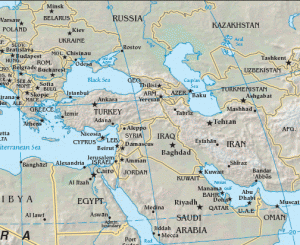Obama, Russia and the Future of Georgia
BY Herschel SmithSignificant attention is being given to Mr. Obama and his administration’s position on engaging the Muslim world. But little attention has been given to what may be a very important exchange over the Caucasus. We have extensively covered Russia’s interest in its near abroad, including in Rapidly Collapsing U.S. Foreign Policy, where we observed that the ceasefire with Georgia:
… has left the strategically important Russian base in Armenia cut off with no overland military transit connections. The number of Russian soldiers in Armenia is limited to some 4000, but during 2006 and 2007 large amounts of heavy weapons and supplies were moved in under an agreement with Tbilisi from bases in Batumi and Akhalkalaki (Georgia). At present there are some 200 Russian tanks, over 300 combat armored vehicles, 250 heavy guns and lots of other military equipment in Armenia – enough to fully arm a battle force of over 20,000 (Nezavisimoye Voyennoye Obozrenie, August 20, 2004). Forces in Armenia can be swiftly expanded by bringing in manpower by air transport from Russia. Spares to maintain the armaments may also be shipped in by air, but if a credible overland military transit link is not established within a year or two, there will be no possibility to either replace or modernize equipment. The forces will consequently degrade, undermining Russia’s commitment to defend its ally Armenia and Moscow’s ambition to reestablish its dominance in the South Caucasus
Russia hasn’t lost interest in the Causasus in spite of the overwhelming worship of the new administration on the world wide stage. They have a long attention span and have kept their eye on the ball, so to speak. At The Captain’s Journal we have recommended the full engagement of the Caucasus region, including transit of logistics through Georgia to neighboring Azerbaijan; from there the supplies would transit across the Caspian Sea to Turkmenistan, and from there South to Afghanistan. This approach would have a dual affect. First it would address the issue of interdiction of supplies through the Khyber region in Pakistan by the Taliban, and second, it would aid and benefit Georgia and assure the world that the West supports its sovereignty.
But perhaps Georgia shouldn’t have sent troops to Iraq to support Operation Iraqi Freedom. The U.S. doesn’t have such a long memory when administrations change. Russia is playing nice when it comes to logistics, in that it has “offered to discuss allowing the US to ship military cargoes across its territory to Afghanistan in a significant step seemingly aimed at building bridges twithWashington” (sic). On another front, the Russians are hailing comrade Obama.
Russia’s Dmitry Medvedev hailed Barack Obama as “my new comrade” Thursday after their first face-to-face talks, saying the US president “can listen” — even if little progress was made on substance.
The Russian president contrasted Obama as “totally different” to his predecessor George W. Bush, whom he blamed for the “mistake” of US missile shield plans fiercely opposed by Moscow.
Obama agreed to visit Moscow in July after his talks with Medvedev on Wednesday on the sidelines of a G20 summit in London aimed at fixing the battered world economy.
“I believe that we managed to establish contact. But Moscow lies ahead. I cannot say that we made much progress on the most serious issues,” he told reporters, adding: “Let’s wait and see.”
“I liked the talks. It is easy to talk to him. He can listen. The start of this relationship is good,” he said, adding: “Today it’s a totally different situation (compared to Bush)… This suits me quite well.”
So Dmitri Medvedev is happy, something that may be a sign of trouble. Continuing:
“Today from the United States there is at least a desire to listen to our arguments,” he said, adding that: “Such defence measures should be carried out jointly “between Washington and Moscow.”
The missile defence plan was “a mistake that the previous US administration is responsible for. Many of my European colleagues also believe this,” the Russian leader added, without specifying who.
Obama, speaking on Wednesday, admitted US-Russian ties had cooled, saying: “What we’ve seen over the last several years is drift in the US-Russian relationship.
“There are very real differences between the United States and Russia, and I have no interest in papering those over. But there are also a broad set of common interests that we can pursue,” he said.
One area of difference is Georgia — Russia sent troops and tanks deep into the ex-Soviet republic last August in response to a Georgian military attempt to retake the breakaway region of South Ossetia.
Medvedev made clear later Thursday that Moscow’s views have not changed — in particular about Georgian President Mikheil Saakashvili — however he feels about Obama.
“Everything that has happened, I will tell you frankly, that the leader of Georgia is responsible for everything. That is my direct and honest and open opinion.
“A lot of people had to pay for the mistakes of one man. We love and appreciate the Georgian people. But I do not want to have any relations with President Saakashvili.”
A catchphrase to remember: “jointly between Washington and Moscow.” So there you have it – the price for the happiness. Georgia had best be preparing to defend itself or have a puppet dictator installed who is subservient to Moscow. Same for the Ukraine, and other nations in the Russian near abroad. As for any possible U.S. reaction to this potential aggression? Well, we wouldn’t want to “cool” our new-found happy relations with Moscow.
